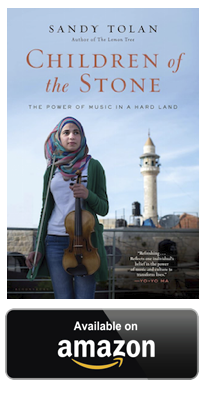Beginning today, Ramallah Café presents Grace Notes, short excerpts from Sandy Tolan’s forthcoming book, Children of the Stone. The book, about one Palestinian’s dream to build a music school in the middle of a military occupation, comes out this month. Children of the Stone is already receiving wide praise from historians, early reviewers, and the famed musician Yo-Yo Ma. More here. In the coming weeks, you’ll even be able to read excerpts ahead of scheduled release–just by sharing with friends. For more excerpts, see this space in the coming days.
————
Five young men stare through the windows of their bus, stalled at a military checkpoint known as Qalandia. Outside, an exhaust-choked border crossing divides Jerusalem from the West Bank city of Ramallah. Behind it stands a massive gray wall, seemingly impenetrable except by special permission. The men look out as drivers jockey for position, funneling into a single line before submitting for inspection. Vendors, mostly children, weave through the knots of vehicles, amid the plastic litter and chunks of broken concrete, selling kebab, tissue packets, pillows, bottles of water, and verses from the Qur’an.
Soldiers enter the bus, M-16s on their shoulders. A young woman inspects documents. She orders twenty people off the bus, including the five young men. They will not be allowed to cross the checkpoint in relative dignity, unlike the foreigners who remain on the air-conditioned coach. Instead, they walk through the heat into a trash-strewn terminal and pass down a long narrow corridor framed by silver bars. It looks like a cattle chute on a western American ranch. At the end the men push through two eight-foot-high turnstiles known as iron maidens. A stray cat straddles a wall above them. KEEP THE TERMINAL CLEAN, a sign instructs.
The men crowd with dozens of others into a small holding area in front of a third floor-to-ceiling turnstile. Every few minutes a red light turns green, a click sounds, and three or four more people pass through the iron maiden to place their possessions on a conveyor belt. They hold up their permits to a dull green bulletproof window and look through the smoky glass, waiting. On the other side, bored-looking soldiers glance up, inspect the documents, and, one by one, wave the permit-holders through.
All but the five young men. “You do not have proper permits,” they are told.
Denied the Holy City, the men click their way backward through the gates, along the metal chute, and into the maze of cars and vendors, uncertain what to do next. It is urgent that they reunite with the others on the bus, so they can all reach Jerusalem.
“Hey, boys,” calls an unshaven man sitting on a stool inside a crude metal shed. The man takes a drag of his cigarette. He glances at the glass tumbler in his hand and the dregs of his Turkish coffee. The young men look behind him, toward the twenty-five-foot-high wall. They approach. Two of them carry long felt bags; another holds a blue canvas case.
The unshaven man takes a last drag of his cigarette, flicks it in the dirt, and looks up. “Ya, shabab,” he says, exhaling a long column of smoke. He smiles. “You boys need to get to Jerusalem?”
“Yes,” says the oldest of the five young men. He appears to be in his thirties: slim, of medium height, with a scraggly beard, a receding line of curly black hair, and bags under his eyes. His eyes are brown and unblinking, narrowed with intent. “It’s very important.”
The man sets down his glass, stands up, and regards the men in front of him. Except for the older one, they look a little nervous.
“For two hundred fifty shekels, I will get you to the middle of Jerusalem,” he boasts. “Fifty shekels each.” About fourteen dollars per man.
“Fine,” says the oldest of the five, who appears to be their leader. “What do we do?”
The man looks over his shoulder. “Jamal,” he says. “Get these guys to Jerusalem.”
They climb into a battered white van. The door slides shut and the driver begins working two phones, making arrangements. He drives with his forearms as the van rattles down a potholed access road. He turns to the men in the van: “Give me the money.” They haggle over price, finally agreeing on eleven dollars each. “But you have to pay now,” the driver says. He gives them his phone number and tells them to call once they reach Jerusalem. Apparently he wants satisfied customers.
A short time later the driver pulls over and steps into a tall garage made of corrugated metal. He returns with a ladder, extends it to its full length, and rests it against the top of the wall. He scales the ladder and sits beside it at the top. “Come,” he commands.
The men approach the base of the wall and look up, shifting their burdens from one shoulder to another.
They are classical musicians: a violinist, a violist, a double bass player, and two timpanists. Their felt bags contain sticks for concert timpani. The blue canvas case holds a violin. The rest of their orchestra is on the bus, rolling south toward Jerusalem. In four hours, they are due to play Beethoven’s Fourth Symphony in the Old City, at a French church built during Crusader times. Hundreds are expected to attend. If these five players don’t make it, the orchestra’s leader has warned, they will cancel the concert. It is impossible, after all, to play Beethoven’s Fourth without the timpani.
The musicians gaze to the top of the wall, where loops of razor wire present a dangerous obstacle. With a sweep of his arm, the smuggler brushes the loops of wire aside, like a curtain. The razor wire has already been cut. This is a regular crossing point.
The smuggler pulls a long knotted rope from a plastic bag, loops it around a metal post at the top of the wall, and drops it to the other side.
“Ta’al, ta’al,” he repeats. “Come.”
The violist goes first. He mounts the ladder rapidly, sits atop the wall, pivots his legs, grabs the rope, and slowly slides down. He tries to use the knots as footholds, but they are small and his feet keep slipping off.
A vehicle approaches on the narrow access road. The violist freezes about halfway down the rope.
“Who’s in that truck?” he shouts, craning his neck upward. “Are those soldiers?”
If they are, the violist will be arrested or, possibly, shot. It would not only mean he won’t get to Jerusalem for the Beethoven concert that evening. It could signal the end of everything he has been building for years.

This is a story about the power of music, first, but also about freedom and conflict, determination and vision. It’s a vivid portrait of life amid checkpoints and military occupation, a growing movement of nonviolent resistance, the prospects of musical collaboration across the Israeli-Palestinian divide, and the potential of music to help children everywhere see new possibilities for their lives.
Want to read more? Buy Children of the Stone today, which hits book shelves on April 7 from Bloomsbury.



This reminds me exactly of a concert I attended (briefly) at the very same venue, St. Anne’s Church, a few years ago. I don’t know how the story turns out yet, but it could even be the same one: Young Palestinian musicians, entry denied at Qalandia, audience waiting expectantly… the would-be concert finally cancelled.
I lived in Israel-Palestine as a volunteer and guide for 14 years, 1999-2013. Along the way, one of the few things that gave me genuine hope was the various music programs serving Palestinian youth. It’s a story that truly deserves telling– and a hearing.
TOM POWERS / Waynesville, NC USA